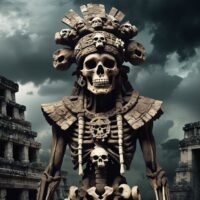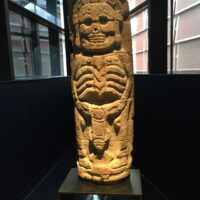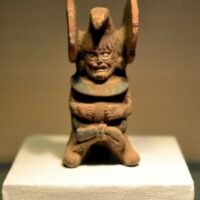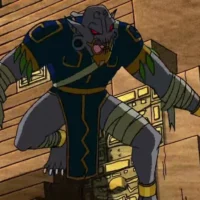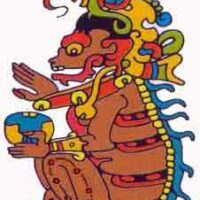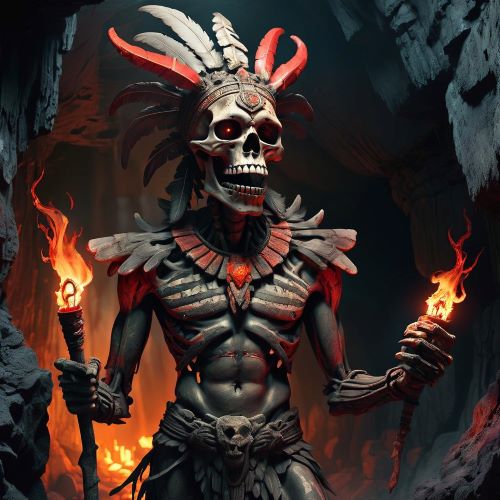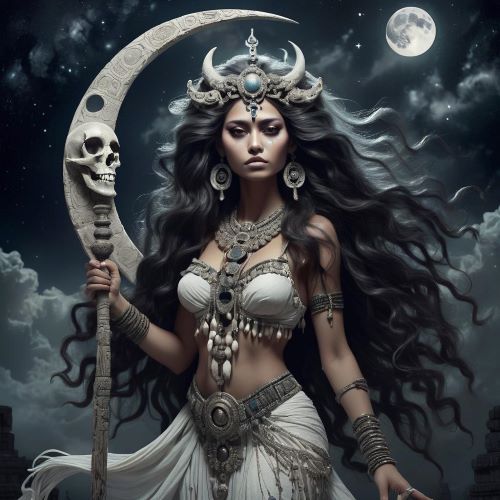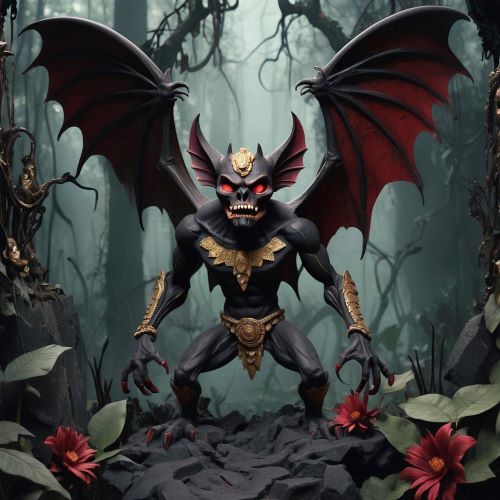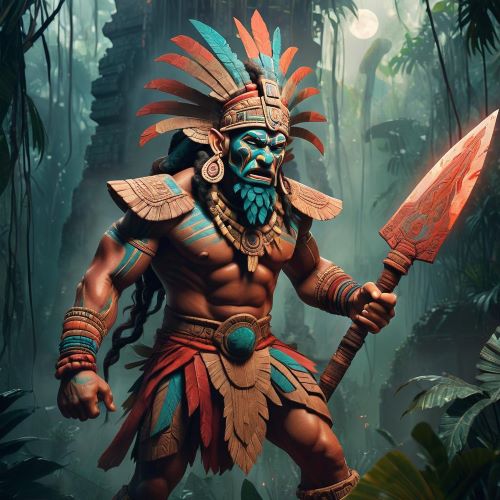Ah Puch : God of Death
Listen
At a glance
| Description | |
|---|---|
| Origin | Mayan Mythology |
| Classification | Gods |
| Family Members | N/A |
| Region | Mexico, Guatemala, Belize, Honduras, and El Salvador |
| Associated With | Underworld |
Ah Puch
Introduction
Ah Puch, the Mayan god of death, is a prominent figure in their mythology, symbolizing death, the underworld, and the inevitable cycle of life and rebirth. Known also as Yum Cimil, he is often depicted as a fearsome deity ruling over Mitnal, the deepest and most terrifying level of the underworld. Ah Puch’s influence extends to Mayan spirituality and rituals, particularly those concerning the journey to the afterlife and the concept of sacrifice. His presence reflects the Mayan civilization’s deep connection to the themes of death and the afterlife, emphasizing the cyclical nature of existence.
Physical Traits
Ah Puch is visually characterized by skeletal features, a decayed and rotting form, and blackened skin, symbolizing his reign over death and the afterlife. His ghastly appearance often includes disfigured or skull-like facial traits, hollow eyes, and skeletal limbs, which reinforce his dominion over decay. He is commonly adorned with bone ornaments or skulls and may carry symbols of authority, such as a staff or spear. At times, he is depicted with a jaguar’s skull or an owl’s head, linking him to the night and powerful predators. These terrifying attributes evoke fear and respect, embodying the inevitability of death and the processes of the underworld.
Family
Ah Puch is recognized within the Maya pantheon as a figure embodying death and the underworld, often contrasting with life-affirming deities. His relationship with the sun god highlights this duality, with the sun representing life and fertility in stark opposition to Ah Puch’s realm of death. Though his familial ties are less clearly defined, he is often linked to other underworld figures like Xibalba and sometimes connected with deities like Ix Chel, the goddess of the moon and childbirth, hinting at a complex interplay between death and nurturing. In certain accounts, Ah Puch is portrayed as a rival to Itzamna, the god of creation, emphasizing the cyclical relationship between life and death in Mayan cosmology. His connections with deities of rebirth and the afterlife further reinforce the interdependence of these forces within Maya beliefs, though interpretations of these relationships may vary across different regions and communities.
Other names
Ah Puch is recognized under various names across different Maya cultures and texts, reflecting his diverse roles and regional interpretations. Commonly known as the “God of Decay” or “God of the Underworld,” he is also referred to as “Eopuco” and “K’uk’ulkan,” highlighting his widespread influence and the variations in mythological narratives. Additionally, he is known by names such as Yum Cimil, Hun Ahau, and Kisin. Each name emphasizes different aspects of his character, with “Yum Cimil” translating to “Lord of Death” and “Kisin” meaning “The Stinking One,” which underscores his association with decay. The use of names like Mictlantecuhtli, shared with an Aztec deity, suggests cultural exchanges or influences between civilizations. The diversity in his names reflects the rich and varied nature of Mayan religious beliefs and regional adaptations of shared myths.
Powers and Abilities
Ah Puch wields considerable influence over death, the afterlife, and the underworld. As the ruler of the underworld, he governs the souls of the deceased, guiding them through their journey and ensuring they are placed in the appropriate afterlife realm. His role is crucial in death rituals and burials, where ceremonies are conducted to appease him and secure a safe passage for the departed. Ah Puch’s powers also extend to causing illness and suffering among the living, which instills both fear and respect for his authority within Maya society.
In addition to his dominion over death, Ah Puch is paradoxically associated with healing and regeneration. This reflects the Maya belief in the cyclical nature of life and death, where death is seen as a transition rather than an end. Through his control over the underworld and his ability to influence both life and death, Ah Puch embodies the complex interplay of existence, demonstrating how death and renewal are intertwined in Mayan cosmology.
Modern Day Influence
Ah Puch’s legacy endures in contemporary culture, where his character continues to inspire various forms of media. His depiction as a harbinger of death and supernatural force frequently appears in literature, film, and video games, especially within the horror and fantasy genres. Artists and writers use his mythological attributes to delve into themes of mortality and the human experience, drawing from the rich narrative of Mayan mythology to explore the darker aspects of existence.
Furthermore, the study of Ah Puch and other Maya deities in archaeology and anthropology enhances our understanding of ancient Mayan civilization, shedding light on their values and practices. His symbolic representation persists in modern discussions about death and the afterlife, reflecting a broader cultural fascination with these concepts. Ah Puch’s continued relevance in contemporary art and media underscores the lasting impact of Mayan mythology on modern perspectives of mortality and spirituality.
Related Images
Frequently Asked Questions
What is lorem Ipsum?
I am text block. Click edit button to change this text. Lorem ipsum dolor sit amet, consectetur adipiscing elit. Ut elit tellus, luctus nec ullamcorper mattis, pulvinar dapibus leo.
What is lorem Ipsum?
I am text block. Click edit button to change this text. Lorem ipsum dolor sit amet, consectetur adipiscing elit. Ut elit tellus, luctus nec ullamcorper mattis, pulvinar dapibus leo.
What is lorem Ipsum?
I am text block. Click edit button to change this text. Lorem ipsum dolor sit amet, consectetur adipiscing elit. Ut elit tellus, luctus nec ullamcorper mattis, pulvinar dapibus leo.
What is lorem Ipsum?
I am text block. Click edit button to change this text. Lorem ipsum dolor sit amet, consectetur adipiscing elit. Ut elit tellus, luctus nec ullamcorper mattis, pulvinar dapibus leo.
What is lorem Ipsum?
I am text block. Click edit button to change this text. Lorem ipsum dolor sit amet, consectetur adipiscing elit. Ut elit tellus, luctus nec ullamcorper mattis, pulvinar dapibus leo.

